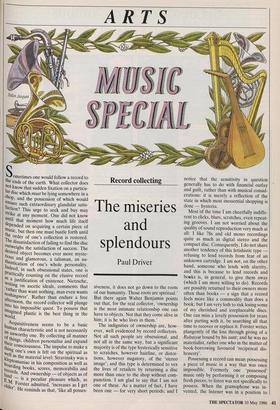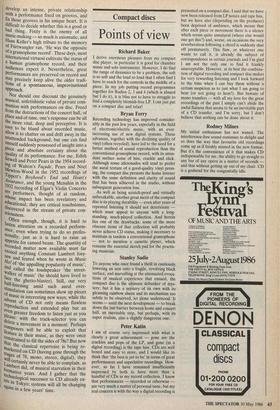ARTS
Sometimes one would follow a record to the ends of the earth. What collector does not know that sudden fixation on a particu- lar disc which must be lying somewhere in a • sh°P, and the possession of which would ensure such extraordinary glandular satis- faction? This urge to seek and buy may strike at any moment. One did not know until that mdment how much life itself depended on acquiring a certain piece of Music, but then one must bustle forth until the order of one's collection is restored. The dissatisfaction of failing to find the disc outweighs the satisfaction of success. The desired object becomes ever more myste- r1,(nts and glamorous, a talisman, an au- tnentication of one's whole personality. Indeed, in such obsessional states, one is Practically counting on the elusive record as a justification of existence. Nietzsche, Writing on ascetic ideals, comments that rather than want nothing, man even wants nothingness' . Rather than endure a free afternoon, the record collector will plunge !lit() his impossible quest. To possess that linagined plastic is the best thing in the World.
, Acquisitiveness seems to be a basic utlinan characteristic and is not necessarily an unworthy one. By collecting all manner ,of t.hings, children personalise and expand !heir consciousness. The impulse to make a thing one's own is felt on the spiritual as W,_,ell as the material level: Stravinsky was a ,ineptomaniac in his composition as well as noarding books, scores, memorabilia and riecords. And ownership — of objects as of ;,I1,..d — is a peculiar pleasure which, as 01'. Forster admitted, 'increases as I get 'der'. He reminds us that, 'like all posses-
Record collecting
The miseries and splendours
Paul Driver
siveness, it does not go down to the roots of our humanity. Those roots are spiritual.' But there again Walter Benjamin points out that, for the real collector, 'ownership is the most intimate relationship one can have to objects. Not that they come alive in him; it is he who lives in them.'
The indignities of ownership are, how- ever, well evidenced by record collectors. Not all such people are obsessional, and not all in the same way, but a significant majority is of the type hysterically sensitive to scratches, however hairline, or distor- tions, however nugatory, of the 'stereo image'; and this type is determined to vex the lives of retailers by returning a disc more than once to the shop without com- punction. I am glad to say that I am not one of these. As a matter of fact, I have been one — for very short periods; and I notice that the sensitivity in question generally has to do with financial outlay and guilt, rather than with musical consid- erations: it is merely a reflection of the state in which most inessential shopping is done — hysteria.
Most of the time I am cheerfully indiffe- rent to clicks, blurs, scratches, even repeat- ing grooves. I am not worried about the quality of sound reproduction very much at all: I like 78s and old mono recordings quite as much as digital stereo and the compact disc. Consequently, I do not share another tendency of this fetishistic type — refusing to lend records from fear of an unknown cartridge. I am not, on the other hand, someone who lends with alacrity, and this is because to lend records and books is, in general, to give them away (which I am more willing to do). Records are possibly returned to their owners more often than books — a sign that a record feels more like a commodity than does a book; but I am very loth to risk losing some of my cherished and irreplaceable discs. One can miss a lovely possession for years after parting with it, be searching all that time to recover or replace it. Forster writes plangently of the loss through giving of a Rubaiyat bound by his aunt; and he was no materialist, rather one who in the matter of book-borrowing favoured 'reciprocal dis- honesty'.
Possessing a record can mean possessing a piece of music in a way that was once impossible. Formerly one 'possessed' music only by performing it or composing fresh pieces; to listen was not specifically to possess. When the gramophone was in- vented, the listener was in a position to develop an intense, private relationship With a performance fixed on grooves, and fix those grooves in his unique heart. It is difficult to decide whether this is a good or bad thing. Fixity is the enemy of all music-making — so much is axiomatic, and Hans Keller's high tribute to the memory of Fiirtwangler ran, 'He was the opposite of a gramophone record'. These days, most international virtuosi cultivate the status of a human gramophone record, and their audiences expect it. Nevertheless, great Performances are preserved on record and may precisely keep alive the older tradi- tions of a spontaneous, improvisational approach.
Nor should one discount the genuinely musical, unfetishistic value of private com- munion with performances on disc. Freed from the distractions of the concert hall, of place and of time, one's response can be all the more vital, deep and perceptive. It is easy to be bland about recorded music, allow it to chatter on and drift away in the unattended background, but one can find oneself suddenly possessed of insight into a Piece and absolute certainty about the quality of its performance. For me, Edith Sitwell and Peter Pears in the 1954 record- ing of Walton's Façade, Pears and Noel Mewton-Wood in the 1952 recordings of TiPpett's Boyhood's End and Heart's Assurance, and the young Menuhin in the 1932 recording of Elgar's Violin Concerto are performers, thought of at random, Whose impact has been revelatory and ed. ucational; they are critical touchstones, discovered in the stream of private con- sciousness.
Often enough, though, it is hard to fasten attention on a recorded perform- a.nee, even when trying to do so profes- sionally; just as it is hard to raise an appetite for canned beans. The quantity of recorded matter now available must far exceed anything Constant Lambert fore- st,aur and feared when he wrote in Music n01 of 'the appalling popularity of music', and called the loudspeaker 'the street- "alker of music' (he should have lived to lace the ghetto-blaster). Still, our very nalf-listening amid such aural over- stimulation can sometimes show up pieces ef music in interesting new ways; while the advent of CD not only means flawless reproduction and extended play but an e.. ev , u greater freedom to listen just as you Pd'iease: with the track-selector you can elete a movement in a moment. Perhaps niP0sers will be able to exploit that teature in their music, as they were once nstrained to fill the sides of 78s? But now at the classical repertoire is being re- marketed on CD (having gone through the stages of 78, mono, stereo, digital), they N:11111 certainly never be able to complain, as La certainly did, of musical starvation in their Ituttnative years. And I gather that the iech,11010gical successor to CD already ex- sts in Tokyo; systems will all be changing again in a few years' time.



























































 Previous page
Previous page